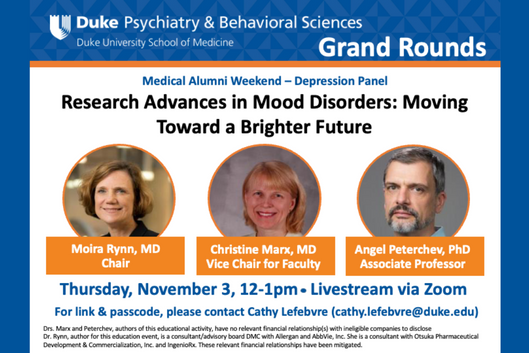Medical Alumni Weekend - Depression Panel: Research Advances in Mood Disorders: MOving Toward a Brighter Future

Medical Alumni Weekend - Depression Panel
Dr. Moira Rynn is Chair for the Department of Psychiatry and Behavioral Sciences at Duke University School of Medicine. She is an internationally renowned expert in the treatment of pediatric mood and anxiety disorders. She has spent her career focused on improving treatments for children, adolescents, and young adults with treatment refractory mood and anxiety disorders. Her most recent studies have examined novel augmentation treatment strategies for pediatric obsessive-compulsive disorder and treatment models for adolescent depression in the primary care setting. Dr. Rynn received her medical degree from Rutgers University. She completed her internship and residency in psychiatry at the University of Pennsylvania Perelman School of Medicine and served as Chief Resident. After completing her adult psychiatry training, she completed a Child and Adolescent Psychiatry Fellowship at the Children's Hospital of Philadelphia followed by a Neuropsychopharmacology Research Fellowship sponsored by the NIMH at the University of Pennsylvania Perelman School of Medicine. Prior to joining Columbia University, Dr. Rynn was medical director of the Mood and Anxiety Disorders Section of the Department of Psychiatry at the University of Pennsylvania Perelman School of Medicine.
Dr. Christine Marx is Vice Chair of Faculty in the Department of Psychiatry and Behavioral Sciences.
Dr. Angel Peterchev directs the Brain Stimulation Engineering Lab (BSEL) which focuses on the development, modeling, and application of devices and paradigms for transcranial brain stimulation. Transcranial brain stimulation involves non-invasive delivery of fields (e.g., electric and magnetic) to the brain that modulate neural activity. It is widely used as a tool for research and a therapeutic intervention in neurology and psychiatry, including several FDA-cleared indications. For over 15 years, BSEL has been continuously supported with multiple NIH grants as well as funding by DARPA, NSF, Brain & Behavior Research Foundation, Coulter Foundation, Duke Institute for Brain Sciences, MEDx, Duke University Energy Initiative, and industry. Further, some of our technology has been commercialized, for example as ElevateTMS cTMS, or incorporated in free software packages, such as SimNIBS.
Link to join: https://duke.zoom.us/j/97971955759







